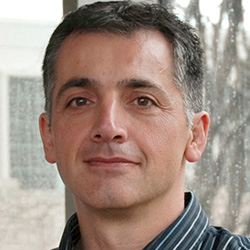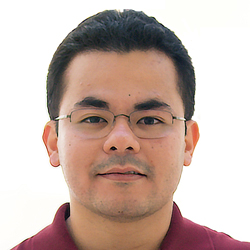Re-architecting the Internet for Resilience and Survivability
The Internet has transformed dramatically over the past 50 years — advancing from a research-focused network primarily used in academia to the cyber-physical infrastructure foundational to modern society and the global economy.
 Northwestern Engineering’s Fabián E. Bustamante and Walter Willinger, chief scientist of NIKSUN Inc., argued in a recent paper that this evolution of the Internet has resulted in faulty assumptions about its continued robustness and its ability to withstand current and emergent threats.
Northwestern Engineering’s Fabián E. Bustamante and Walter Willinger, chief scientist of NIKSUN Inc., argued in a recent paper that this evolution of the Internet has resulted in faulty assumptions about its continued robustness and its ability to withstand current and emergent threats.
Bustamante is a professor of computer science at the McCormick School of Engineering and director of the AquaLab, a research laboratory investigating large-scale networks and distributed systems.
Bustamante and Willinger advocate for a new research agenda aimed at re-architecting the Internet for resilience and survivability, ensuring that the network can fulfill its mission in the face of potentially catastrophic failure events.
As an initial step in developing such a grand-challenge research agenda, Bustamante and Willinger organized the workshop “Towards Re-architecting Today’s Internet for Survivability,” which they hosted last month in downtown Evanston, Illinois.
Sponsored by the National Science Foundation, the workshop convened a multi-disciplinary team of invited scientists from various disciplines, including networking, power/smart grid, control theory, and resilience engineering. Among the participants were Northwestern faculty members Luís A.N. Amaral, Erastus Otis Haven Professor of Chemical and Biological Engineering; Pete Beckman, codirector of the Northwestern Argonne Institute of Science and Engineering and Argonne Distinguished Fellow; Igor Kadota, assistant professor of electrical and computer engineering; and Ermin Wei, associate professor of electrical and computer engineering and industrial engineering and management sciences.
The overlap between Kadota’s research direction and the workshop topic is significant. He investigates wireless communication networks and is working on the development of new architectures and protocols that will enable next-generation wireless networks to support mission-critical applications that require the underlying network to be robust and resilient to failure.
 “A superb feature of the workshop was the inclusion of multiple research communities,” Kadota said. “We had the unique opportunity to learn from researchers that work on control theory, core network infrastructure, content distribution networks, and power systems, allowing for cross-pollination of ideas.”
“A superb feature of the workshop was the inclusion of multiple research communities,” Kadota said. “We had the unique opportunity to learn from researchers that work on control theory, core network infrastructure, content distribution networks, and power systems, allowing for cross-pollination of ideas.”
Workshop co-organizers included David Alderson (Naval Postgraduate School), John Doyle and Steven Low (California Institute of Technology), Stefan Savage (University of California, San Diego), and Henning Schulzrinne (Columbia University).
The workshop combined overview sessions outlining current research efforts and the latest developments in areas related to Internet survivability with working group discussion sessions.
The group aimed to start sketching the research agenda around three high-level tasks:
- Defining and outlining the architectural principles of resilience and survivability as well as reassessing the threat landscape to the network’s basic functioning amid constant economic, political, and societal evolution
- Coordinating efforts to re-architect for Internet survivability in concert with the development and growth of the smart grid, acknowledging the critical interdependency of the Internet with the power grid
- Developing new stress-testing approaches to simulate the Internet at a global scale, allowing researchers to gain insights into how the Internet responds to different types of failure scenarios and improve the viability of designs
Session organizers and speakers included:
- “Reconsidering Internet Architecture” — John Doyle (California Institute of Technology), Ramesh Govindan (University of Southern California), Fernando Paganini (Universidad ORT Uruguay), Lixia Zhang (University of California, Los Angeles)
- “Threats to Internet Survivability” — Zakir Durumeric (Stanford University), Stefan Savage and Aaron Schulman (University of California San Diego)
- “Powergrid and Internet” — Dominic Gross (University of Wisconsin-Madison), Steven Low (California Institute of Technology), Fernando Paganini (Universidad ORT Uruguay), Joshua Taylor (University of Toronto), Lang Tong (Cornell University), and Le Xie (Texas A&M University)
- “Control and Learning” — James Anderson (Columbia University), Nikolai Matni (University of Pennsylvania)
- “Resilience Engineering” — David Alderson (Naval Postgraduate School), John Allspaw (Adaptive Capacity Labs), Lorin Hochstein (Coupang, Inc.), Zoran Perkov, and David Woods (The Ohio State University)
- “Public and Private Sector Perspective” — Marwan Fayed (Cloudflare), Yih-Chun Hu (University of Illinois Urbana-Champaign), Douglas Montgomery (National Institute of Standards and Technology), and Henning Schulzrinne (Columbia University)
Bustamante and Willinger are currently working on a report while considering follow-up activities to build on the momentum gained during the workshop.
